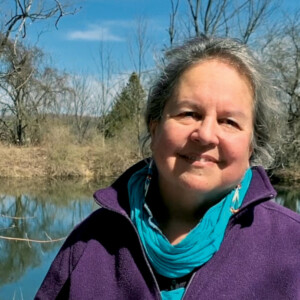
Robin Kimmerer ’75 at the pond on her property.
In a pandemic where people are distancing, a book that speaks of connectivity with nature is resonating with people seven years after it was originally published.
Dr. Robin Kimmerer’s ’75 “Braiding Sweetgrass: Indigenous Wisdom, Scientific Knowledge, and the Teaching of Plants” is a collection of essays weaving traditional ecological knowledge with scientific knowledge to examine the relationship people have, and can have, with the living environment. The book has been a fixture on The New York Times Paperback Nonfiction Best Sellers list since February 2020.
The book’s central message is an invitation to enter into a reciprocal relationship with the earth, to understand that the earth is showering people with gifts, and to acknowledge that they have responsibilities in return, according to Kimmerer.
“It’s an invitation to reciprocity,” said Kimmerer, SUNY Distinguished Teaching Professor of Environmental Biology.
“In these times of pandemic, social upheaval, and economic crisis, we are struck by our need for connection and relationship,” she said. “Braiding Sweetgrass is about relationships and entering into the right relationship with the natural world. So perhaps the times we’re living in have increased people’s awareness that there’s an empty place in their lives, a kind of ‘species loneliness’ for a mutual relationship with nature.”
According to her publisher, Milkweed Editions, the book’s rise in popularity can partially be attributed to the personal connection people experience reading it and then passing it along to their friends.
“It’s gratifying to me that people are passing it along, because it’s a kind of a testimony to a way of thinking about healing our relationship with land, from purely consumption, to respect and reciprocity, from consumer to ecological citizens,” said Kimmerer. “So many readers have written and said, ‘I thought I was alone in my deep concern for the earth, and then when I realized I wasn’t, I felt like I had more of a voice and more agency.’”
Kimmerer and Braiding Sweetgrass have also received A-Lister attention Oscar- winning actress Natalie Portman and Emma Watson, best known as Hermione Granger in the Harry Potter series, both recommended Braiding Sweetgrass to their Instagram (IG) followers. Portman interviewed Kimmerer for her IG book club. Pulitzer Prize-winning author of The Overstory, Richard Powers, also recommended the book.
Kimmerer is the director of the Center for Native Peoples and the Environment (CNPE) at SUNY ESF.
The pandemic has made it harder to have the usual level of intensity and liveliness with many of their students studying from their home communities.
“It’s very challenging,” she said, “but at the same time, we have an amazing cohort of new and continuing Sloan scholars that are working on their research and classes. For me, it’s a real bright spot to be involved in supporting those wonderful young Indigenous scholars.” (Read article about our Sloan scholars) Kimmerer believes there are positives to take away from the pandemic.
“There’s the potential for all kinds of transformation at this time,” she said. “The slower pace allows us to be more present with the natural world and with each other.”
Along with a deeper relationship with nature, she hopes a sense of ecological compassion will arise.
“Because we have felt physical vulnerability ourselves, that opens us to compassion for the vulnerability of others and the realization that what we do has an impact that affects everyone and broadly speaking, everything,” she said.
Braiding Sweetgrass is becoming a movement in its own right. Teachers are writing curriculum based on the writings. Artists have created musical compositions, artwork, plays, and there are several film proposals, according to Kimmerer.
Kimmerer receives on average 10 email messages a day from people who were touched by the book. “They’re lovely, thoughtful notes,” she said. “I get all kinds of those life-changing messages,” she said. “I feel like the book is a seed, and it’s fallen on fertile ground. I just didn’t know how much fertile ground and how many good gardeners were out there.”
The Center for Native Peoples and the Environment (CNPE) creates programs that draw on the wisdom of both indigenous and scientific knowledge in support of our shared goals of environmental sustainability. With your support, the work of the CNPE can continue to grow. Please consider making your gift today: www.esf.edu/nativepeoples/support.htm.


